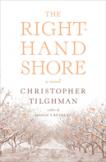No More Edens
In the opening frame of Christopher Tilghman’s novel The Right Hand Shore, Mary Bayly is interviewing her distant cousin, Edward Mason, to see if he is a suitable heir for Mason’s Retreat, the ancestral farm established in 1657 by the emigrant who retreated to Maryland’s eastern shore after the failed Catholic uprising in England. It is 1920; Mary is 55, childless and dying of cancer. When Edward tells her he is certain he can handle the burdens that Mary tells him come with the Retreat, she thinks him a fool, for she knows that he is thinking only of the financial responsibilities. She knows that the Retreat carries with it the curse of slavery, failed race relations and human pride.
The Right Hand Shore, the story of Mason’s Retreat from 1857 to 1920, illustrates that the world, by its nature, is cursed; any belief that we can control our world is doomed. Through the struggle of two generations of the Bayly/Mason family to remake the Retreat after slavery, a struggle that incorporates a tension between the Catholic faith and science, Tilghman dramatizes the theme that there are no more Edens.
The inside story of Tilghman’s novel begins with the cold-hearted sale by Boss Mason, Mary’s grandfather, of his slaves just before the Civil War. It is this sale, according to Ophelia, Boss’s daughter and Mary’s mother, that brings a curse on the Retreat. Wyatt Bayly, Ophelia’s husband, does not share Ophelia’s beliefs. He is a Northerner, not touched by the heritage of slavery; and as a Catholic by marriage, he is not touched by Ophelia’s sense of inherited evil.
Wyatt believes that with the proper scientific approach he can turn the estate into orchards of peach trees and that these trees can draw “the poisons from the soil and, in their magic, transform them into sweetness.” Though Ophelia can understand Wyatt’s efforts, she sees his plan as “deeply ambitious,” and with each orchard planted, she becomes more separated from Wyatt and the Retreat. This separation culminates in Ophelia’s enrolling of Mary, then a young teenager, in Catholic schools in France and Baltimore, cities where she then lives herself.
Mary’s Catholic education highlights a tension between faith and science. She discovers that her desire to be recognized for her scholarship is prideful. Opposed to her father’s belief in the certainty of scientific inquiry, she is told that the Catholic faith is filled with paradox and contradiction. A teacher, Mother Barat, tells her, “When faith and reason cannot be reconciled, a saint chooses faith.” Although Mary turns the farm into a dairy, she resists pasteurizing the milk on religious grounds.
Her father’s attempt to remake the Retreat includes his belief that by offering good wages for good work, he can improve the relations between blacks and whites as well. It is this aspect of his plan that leads to perhaps the most dynamic thread in the novel—the relationship between Mary’s younger brother, Thomas, and Randall, the son of Abel Terrell, Wyatt’s black field manager. Thomas and Randall grow up together, almost inseparable. Nearly everyone on the estate views them as brothers. Wyatt recognizes early the potential of Randall’s intellect and decides to educate both boys. Randall’s superiority becomes immediately apparent. Thomas, unlike his sister, Mary, does not have Wyatt’s mind; he is much more dreamer than scientist.
As the boys mature their relationship changes. Thomas is drawn in friendship toward Randall’s younger sister Beal, and Randall refuses to allow it to go on. He tells Thomas, who sees himself and Beal as some modern version of a classic tale of forbidden love, that even if Thomas’s intentions are noble, there is no chance that Beal can be the lady of Mason’s Retreat; she will be perceived as nothing more than Thomas’s whore, whether she is or not. Tragedy strikes in a variety of forms. Are the disastrous events the result of the family’s attempts to “rearrange Creation”?
Ironically, it is Thomas’s future that appears brightest. His faith in the love shared by him and Beal eventually brings them together. And it is the Catholic Church, solicited by Mary, that assists in the secret marriage of Thomas and Beal and their move to France. In their union Tilghman seems to say joy is possible in our cursed world. And yet we have Mary’s words the night before the wedding: she tells Thomas the marriage “cost us all much.”
Tilghman’s story-within-a-story format is a good fit for The Right Hand Shore. It helps to generate interest by introducing us, before the story begins, to Mary as she will be at the end of it. This allows us to see how its many characters are transformed in this struggle with the earth. Finally, Mary sums it up: “My belief that I could influence the future, bend God’s will,” is a sin as old as Adam and Eve.
The Right Hand Shore is a story of failed human aspirations in an imperfect world. Tilghman makes clear that in our world there are factors—the sins of our past, the flaws in nature, perhaps even love—that we cannot control and that make false any hope to impose our will. As Abel, Randall’s father, states, “Much as you gain, you lose more.” The Right Hand Shore is a very human story, and Tilghman tells it through characters who make us feel their losses.
This article also appeared in print, under the headline “No More Edens,” in the July 2, 2012, issue.








